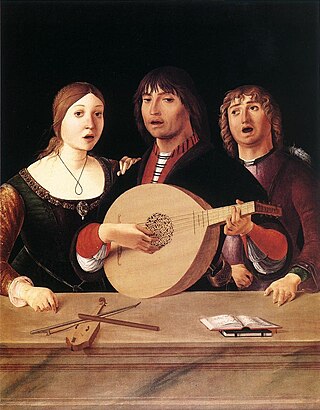Related Research Articles

John Dowland was an English Renaissance composer, lutenist, and singer. He is best known today for his melancholy songs such as "Come, heavy sleep", "Come again", "Flow my tears", "I saw my Lady weepe", "Now o now I needs must part" and "In darkness let me dwell", but his instrumental music has undergone a major revival, and with the 20th century's early music revival, has been a continuing source of repertoire for lutenists and classical guitarists.

Thomas Campion was an English composer, poet, and physician. He was born in London, educated at Cambridge, studied law in Gray's inn. He wrote over a hundred lute songs, masques for dancing, and an authoritative technical treatise on music.

Henry Lawes was the leading English songwriter of the mid-17th century. He was elder brother of fellow composer William Lawes.
An air is a song-like vocal or instrumental composition. The term can also be applied to the interchangeable melodies of folk songs and ballads. It is a variant of the musical song form often referred to as aria.

The term lute song is given to a music style from the late 16th century to early 17th century, late Renaissance to early Baroque, that was predominantly in England and France. Lute songs were generally in strophic form or verse repeating with a homophonic texture. The composition was written for a solo voice with an accompaniment, usually the lute. It was not uncommon for other forms of accompaniments such as bass viol or other string instruments, and could also be written for more voices. The composition could be performed either solo or with a small group of instruments.
Thomas Tomkins was a Welsh-born composer of the late Tudor and early Stuart period. In addition to being one of the prominent members of the English Madrigal School, he was a skilled composer of keyboard and consort music, and the last member of the English virginalist school.

Anthony [Antony] Holborne [Holburne] was a composer of music for lute, cittern, and instrumental consort during the reign of Queen Elizabeth I.
Word painting, also known as tone painting or text painting, is the musical technique of composing music that reflects the literal meaning of a song's lyrics or story elements in programmatic music.
Robert Jones was an English lutenist and composer, the most prolific of the English lute song composers.
John Bartlet, also John Bartlett, was an English Renaissance composer. He was employed as a musician by Sir Edward Seymour, Earl Hertford (1539–1621) and accompanied him on a diplomatic visit to Brussels in 1605.
"Flow, my tears" is a lute song by the accomplished lutenist and composer John Dowland (1563–1626). Originally composed as an instrumental under the name "Lachrimae pavane" in 1596, it is Dowland's most famous ayre, and became his signature song, literally as well as metaphorically: he would occasionally sign his name "Jo: dolandi de Lachrimae".
The Second Book of Songs is a book of songs composed by Renaissance composer John Dowland and published in London in 1600. He dedicated it to Lucy Russell, Countess of Bedford.

"Come Again, sweet love doth now invite" is a song by John Dowland. The lyrics are anonymous. The song is bitter-sweet, typical of Dowland who cultivated a melancholy style.
Martin Peerson was an English composer, organist and virginalist. Despite Roman Catholic leanings at a time when it was illegal not to subscribe to Church of England beliefs and practices, he was highly esteemed for his musical abilities and held posts at St Paul's Cathedral and, it is believed, Westminster Abbey. His output included both sacred and secular music in forms such as consort music, keyboard pieces, madrigals and motets.

William Corkine was an English composer, lutenist, gambist and lyra viol player of the Renaissance.

"My Lord Chamberlain, His Galliard " is a piece by John Dowland for the lute. It was printed in his First Booke of Songes or Ayres. The Lord Chamberlain at the time of publication was George Carey, 2nd Baron Hunsdon who with his wife Elizabeth was the dedicatee of the First Book.

Early music of Britain and Ireland, from the earliest recorded times until the beginnings of the Baroque in the 17th century, was a diverse and rich culture, including sacred and secular music and ranging from the popular to the elite. Each of the major nations of England, Ireland, Scotland, and Wales retained unique forms of music and of instrumentation, but British music was highly influenced by continental developments, while British composers made an important contribution to many of the major movements in early music in Europe, including the polyphony of the Ars Nova and laid some of the foundations of later national and international classical music. Musicians from the British Isles also developed some distinctive forms of music, including Celtic chant, the Contenance Angloise, the rota, polyphonic votive antiphons, and the carol in the medieval era and English madrigals, lute ayres, and masques in the Renaissance era, which would lead to the development of English language opera at the height of the Baroque in the 18th century.
Now o Now I Needs Must Part was written by the sixteenth-seventeenth-century composer John Dowland. A bittersweet contemplation of love and loss, it was first published in Dowland's book called First Booke of Songes or Ayres of foure partes with Tableture for the Lute (1597).
Thomas East,, was an English printer who specialised in music. He has been described as a publisher, but that claim is debatable. He nevertheless made an important contribution to musical life in England. He printed the significant madrigal collection, Musica Transalpina, which appeared in 1588.

The First Book of Songs is a collection of songs by John Dowland which includes one instrumental piece. The book was published in London in 1597 and was reprinted four times during the composer's lifetime.
References
- This article incorporates text from a publication now in the public domain : Grove, George, ed. (1900). . A Dictionary of Music and Musicians . London: Macmillan and Company.